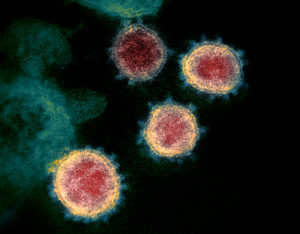 Covid-19 infections are linked to many long-term health problems, but now a surprising one - an increased risk for erectile dysfunction in sexually active men. University of Rome researchers found that the risk of developing erectile dysfunction (ED) increased six-fold after a COVID-19 infection. They also found that a person who already has erectile dysfunction is at five times higher risk for a COVID-19 infection.
Covid-19 infections are linked to many long-term health problems, but now a surprising one - an increased risk for erectile dysfunction in sexually active men. University of Rome researchers found that the risk of developing erectile dysfunction (ED) increased six-fold after a COVID-19 infection. They also found that a person who already has erectile dysfunction is at five times higher risk for a COVID-19 infection.
They thought that erectile dysfunction after COVID-19 could be either a short or long-term effect - meaning it might or might not go away over time.
Why would a coronavirus infection lead to erectile dysfunction? Evidence is finding that even "silent" asymptomatic COVID-19 infections may have an effect on small blood vessels so that there is endothelial dysfunction, which is impaired functioning of the inner lining of blood vessels. This means that arteries and arterioles are unable to dilate fully, and so blood supply to the penis can be blocked or narrowed.
Erectile dysfunction (ED) has been often considered a sign (a hallmark) of endothelial dysfunction. Higher rates of erectile dysfunction occur among men suffering from hypertension, obesity, diabetes, and heart disease.
The University of Rome researchers summed it up as get vaccinated or "Mask up to keep it up."
A related finding: Last year a study (conducted in China) that autopsied 12 persons who had died of COVID-19 found that they had damage in the testicles - with inflammation, fluid accumulation, and reduced numbers of Leydig cells (which normally produce testosterone).
Excerpts from Medscape: Risk for Erectile Dysfunction Sixfold Higher in Men With COVID-19
COVID-19 increases the risk of developing erectile dysfunction (ED) by nearly sixfold, according to data from the first study to investigate the association between ED and COVID-19 in young men in a real-life setting.
The preliminary data also indicated that ED is a marker of increased susceptibility to SARS-CoV-2 infection. Men with ED are more than five times more likely to have COVID-19.
The study, which was led by Emmanuele A. Jannini, MD, professor of endocrinology and medical sexology, University of Rome Tor Vergata, Rome, Italy, was published on 20 March in Andrology.
ED can be both a short-term and a long-term complication of COVID-19, he suggests.
"When offered, men should have the COVID vaccination. It also gives a whole new meaning to wearing the mask ― mask up to keep it up," says Jannini. "It could possibly have the added benefit of preventing sexual dysfunction."
He points out that older age, diabetes, high body mass index (BMI), and smoking increase the risk of contracting COVID-19. "These are the same as risk factors for ED. Results of our study agree with the pathophysiological mechanisms linking ED, endothelial dysfunction, and COVID-19. Basically, endothelial dysfunction is common in both conditions [COVID-10 and ED].
Prior research has suggested that asymptomatic COVID-19 could be associated with subclinical microvascular involvement with long-term cardiovascular effects.
Data were drawn from the Sex@COVID online survey, which was conducted from April 7 to May 4, 2020, in Italy. The survey included 6821 participants aged 18 years or older (4177 women; 2,644 men; mean age, 32.83 ± 11.24 years). Participants were stratified on the basis of marital status and sexual activity during lockdown. From these participants, 985 sexually active men were identified, among whom 25 (2.54%) reported having tested positive for COVID-19. These persons were matched with 75 COVID-19-negative men using propensity score matching in a 1:3 ratio.
Results showed that the prevalence of ED was significantly higher among men who self-reported a history of COVID-19 compared to a matching COVID-negative population (28% vs 9.33%; P = .027).
Andrology. Published online March 20, 2021. Full text
